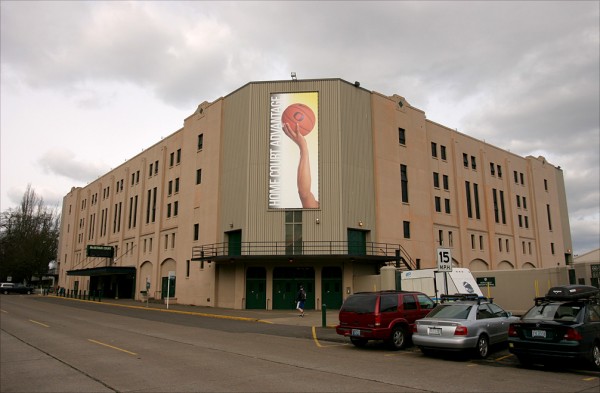Eulogy For an Old Barn: Oregon’s McArthur Court
Posted by rtmsf on January 1st, 2011Kenny Ocker is an RTC contributor.
Oregon’s basketball game Saturday against Arizona State on the surface seems to just be an early-season Pac-10 Conference game between two teams that started off their seasons earlier this week with disappointing blowout losses. However, the game is also the last men’s basketball game at McArthur Court, Oregon’s 84-year-old on-campus arena, before the Ducks move into the $200-million, Phil Knight-funded Matthew Knight Arena on the other side of campus. McArthur Court was constructed in 1926 and was paid for by an increase in student fees. The arena has played host to many events and teams over the years, from Elvis Presley and Johnny Cash, to the Japanese men’s national gymnastics team’s first loss in international competition, to Oregon gymnastics and wrestling, but the building nicknamed The Pit is best known as the home of Oregon basketball.
The Ducks have an occasionally storied tradition as a basketball school, and McArthur Court has been there for nearly all of it. The team dubbed the Tall Firs won the NCAA’s first national championship in 1939, led by the wonderfully named center Slim Wintermute and the wind-erfully named forward Lauren Gale. Those two, along with point guard Bobby Aney, were named All-Americans, as the Ducks went 29-5 in the season en route to the NCAA title. (I don’t believe “One Shining Moment” was played then.) Oregon’s form suffered after this, with only three NCAA Tournament berths between the 1939 title and 1995. The Ducks went to the NCAAs in 1945, 1960 and 1961, with an Elite Eight trip in 1960.
However, the program undertook a rebirth in the 1970s, led by former Penn head coach Dick Harter, who dubbed McArthur Court “The Pit,” a nickname that lives on to this day and is reflected in the name of the student section, the Pit Crew. Harter’s “Kamikaze Kids” had three straight berths to the NIT from 1975 through 1977. Those teams were led by All-American Ron Lee, but also featured future Oregon basketball coach Ernie Kent, the man who put Ducks basketball back on the map after a lackluster decade in the 1980s.










































